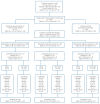Efficacy and mood conversion rate during long-term fluoxetine v. lithium monotherapy in rapid- and non-rapid-cycling bipolar II disorder
- PMID: 23099447
- PMCID: PMC3613721
- DOI: 10.1192/bjp.bp.111.104711
Efficacy and mood conversion rate during long-term fluoxetine v. lithium monotherapy in rapid- and non-rapid-cycling bipolar II disorder
Abstract
Background: Controversy exists over antidepressant use in rapid-cycling bipolar disorder.
Aims: Exploratory analysis of safety and efficacy of fluoxetine v. lithium monotherapy in individuals with rapid- v. non-rapid-cycling bipolar II disorder.
Method: Randomised, double-blind, placebo-controlled comparison of fluoxetine v. lithium monotherapy in patients initially stabilised on fluoxetine monotherapy (trial registration NCT00044616).
Results: The proportion of participants with depressive relapse was similar between the rapid- and non-rapid-cycling groups (P = 0.20). The odds of relapse were similar between groups (P = 0.36). The hazard of relapse was similar between groups (hazard ratio 0.87, 95% CI 0.40-1.91). Change in mania rating scores was similar between groups (P = 0.86). There was no difference between groups in the rate of syndromal (P = 0.27) or subsyndromal (P = 0.82) hypomania.
Conclusions: Depressive relapse and treatment-emergent mood conversion episode rates were similar for lithium and fluoxetine monotherapy and placebo during long-term, relapse-prevention therapy of rapid- and non-rapid-cycling bipolar II disorder.
Conflict of interest statement
None.
Comment in
-
Antidepressants and rapid-cycling bipolar II disorder: dogma, definitions and deconstructing discrepant data.Br J Psychiatry. 2013 Apr;202(4):251-2. doi: 10.1192/bjp.bp.112.120550. Br J Psychiatry. 2013. PMID: 23549940
-
Antidepressants in rapid-cycling bipolar disorder.Br J Psychiatry. 2013 Jul;203(1):75. doi: 10.1192/bjp.203.1.75. Br J Psychiatry. 2013. PMID: 23818536 No abstract available.
-
Authors' reply.Br J Psychiatry. 2013 Jul;203(1):75. doi: 10.1192/bjp.203.1.75a. Br J Psychiatry. 2013. PMID: 23869043 No abstract available.
References
-
- Oppenheim G. Drug-induced rapid cycling: possible outcomes and management. Am J Psychiatry 1982; 139: 939–41 - PubMed
-
- Coryell W, Solomon D, Turvey C, Keller M, Leon AC, Endicott J, et al. The long-term course of rapid-cycling bipolar disorder. Arch Gen Psychiatry 2003; 60: 914–20 - PubMed
-
- Koukopoulos A, Sani G, Koukopoulos AE, Minnai GP, Girardi P, Pani L, et al. Duration and stability of the rapid-cycling course: a long-term personal follow-up of 109 patients. J Affective Disord 2003; 73: 75–85 - PubMed
-
- Cate-Carter TD, Mundo E, Parikh SV, Kennedy JL. Early age at onset as a risk factor for poor outcome of bipolar disorder. J Psychiatr Res 2003; 37: 297–303 - PubMed
-
- Wehr TA, Goodwin FK. Can antidepressants cause mania and worsen the course of affective illness? Am J Psychiatry 1987; 144: 1403–11 - PubMed
Publication types
MeSH terms
Substances
Associated data
Grants and funding
LinkOut - more resources
Full Text Sources
Other Literature Sources
Medical


